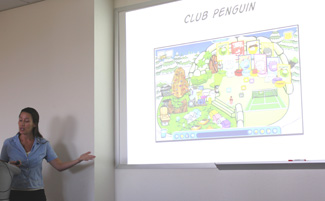Assessing Literacy in Kids' Online Sites
August 11, 2010 / By Anna Lynn Spitzer
|
The number of virtual worlds aimed at elementary school-age children has exploded over the past several years and kids are giving these sites the thumbs-up. 2009 figures indicate that 83 million users are registered at online sites like Jumpstart, Pixie Hollow, Barbie Girls, Poptropica, Webkinz World and Club Penguin.
Rebecca Black, assistant professor of education and a SURF-IT mentor, is interested in finding out whether these online worlds encourage literacy and social development, and offer age-appropriate developmental skills. She shared her research with a full house at this week’s SURF-IT lunchtime Summer Seminar Series.
Black and her students, including SURF-IT student Ana Maria Sanchez, are conducting a qualitative study using ethnographic methods on two of these sites: Webkinz World and Club Penguin. This approach involves researchers participating online as well as observing the ways in which children use the sites.
She and her student researchers inhabited the online worlds for at least 8 hours a week over the course of 20 weeks, Black said, in order to better understand the role the sites play in fostering the development of literacy, technology skills, learning, and problem solving, as well as a sense of community and identity. She chose Webkinz World and Club Penguin because they are commercial, appeal to both sexes and have chat systems that allow for interaction.
Black is comparing the online worlds with offline protocols with proven track records in helping children develop language and literacy skills. These include environmental print (signs and labels), functional print (instructions and rules), receptive language development (opportunities to read and hear language), expressive language development (writing, speaking and drawing) and literacy artifacts (the use of symbols to convey language and meaning).
She found that both Webkinz World and Club Penguin contain all of these. “Both sites have the potential to be productive contexts for early literacy development in part because they have many of the features associated with literacy protocol,” she said. In addition, both contain what she calls “linguistic scaffolding,” a term for activities that help young children take the next developmental step. Navigation menus combine print and icons, aiding pre-readers in navigating the game more easily, and text bubbles accompany characters’ speech, helping kids connect what they’re hearing with what they’re seeing.
Both sites offer stories, advice columns, arts and crafts, and other activities that provide opportunities for children to develop receptive language skills.
But Black also learned that the sites contain a little something extra. Both subtly position children as consumers by encouraging them to “buy” items with the site’s currency or upgrade their memberships. Webkinz World promotes purchases in its Kinzville Times newspaper by incorporating immersive advertising techniques and in its “advice” column by ghost-writing questions pertaining to purchases instead of allowing children to contribute their own questions.
While both sites incorporate “chat” rooms for kids to communicate with each other, they are limited by their efforts to maintain safety and security. Instead of allowing unfiltered chat, “safe-chat” systems, which can be used without parental permission, are structured into predetermined categories, forcing children to choose from what’s available. These systems disallow use of many words, prohibit inventive spelling and often preclude the use of proper grammar. “Chat systems are so prohibitive and poorly designed that many of the children I’ve spoken with don’t even use them,” Black said.
But the biggest problem is that young children can’t understand them. “They don’t know how to locate what they want to ask until they reach a certain developmental point,” Black said. “That’s why when you go onto a safe-chat server, all you see are a lot of emoticons; you don’t see a lot of conversation.”
In addition to its safe-chat option, Club Penguin offers a less restrictive chat system that requires parental approval. Because it does allow for invented spelling of words and more natural language usage, children communicate more freely, produce more of their own content and engage in socio-dramatic and fantasy play.
One player hosts “talk shows” on her site, researching her guests so that interviews are authentic and later posting them on YouTube. The same player uses in-game screen shots to complain about rules she finds unfair. These activities provide an important part of language and social development, Black said, as well as the first steps into civic engagement.
Club Penguin also encourages children to submit content, and publishes their questions, comments, poems, jokes and riddles. In addition, it takes advantage of online capabilities, providing opportunities for kids to conduct off-site research as a way to advance an on-site activity.
“A lot of participation in this space involves distributed knowledge and player-produced content,” Black said. “Being able to produce content for authentic audiences who care about what you’re writing … is a very motivating factor for language and literacy development.”
-- Anna Lynn Spitzer


